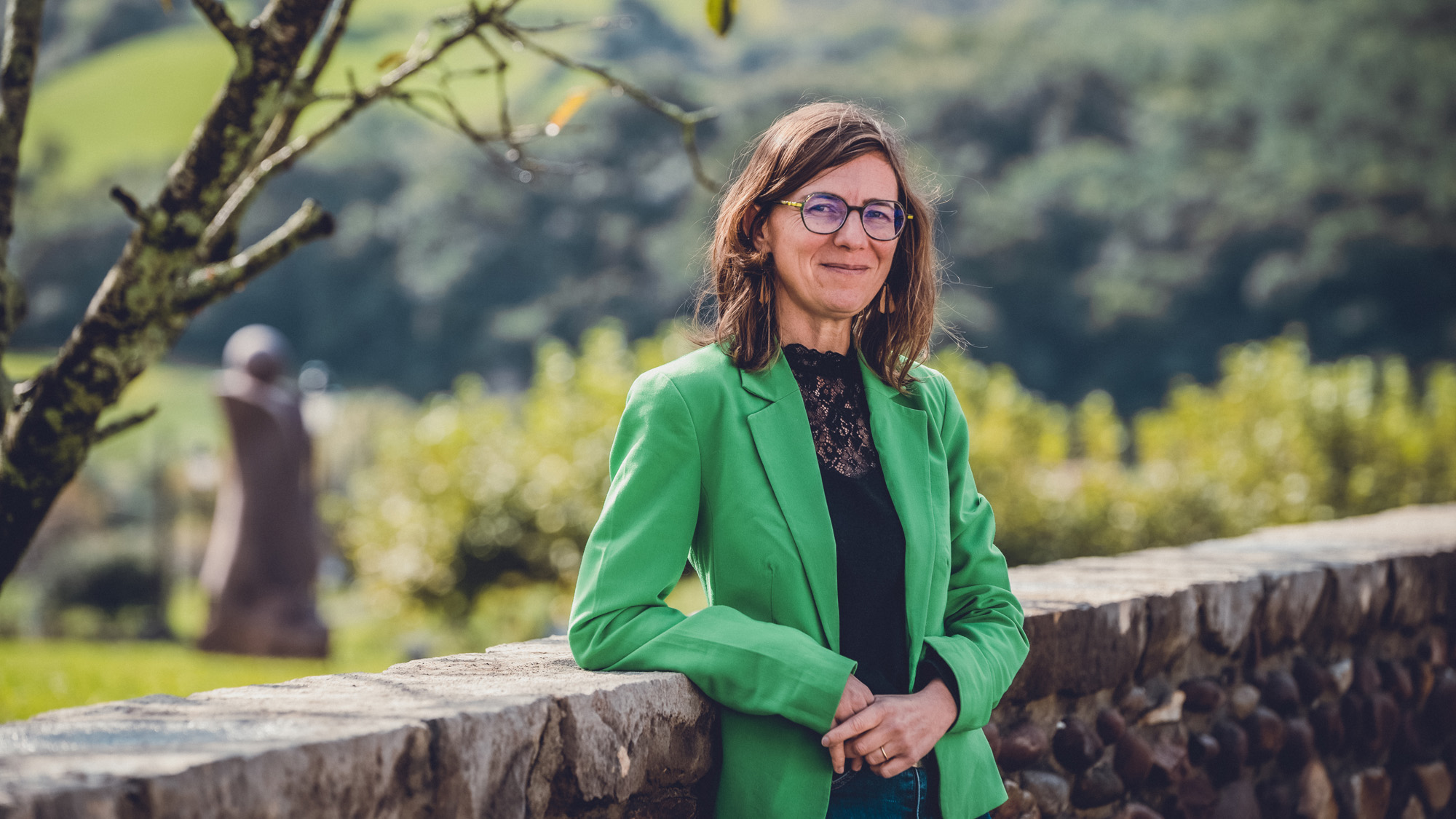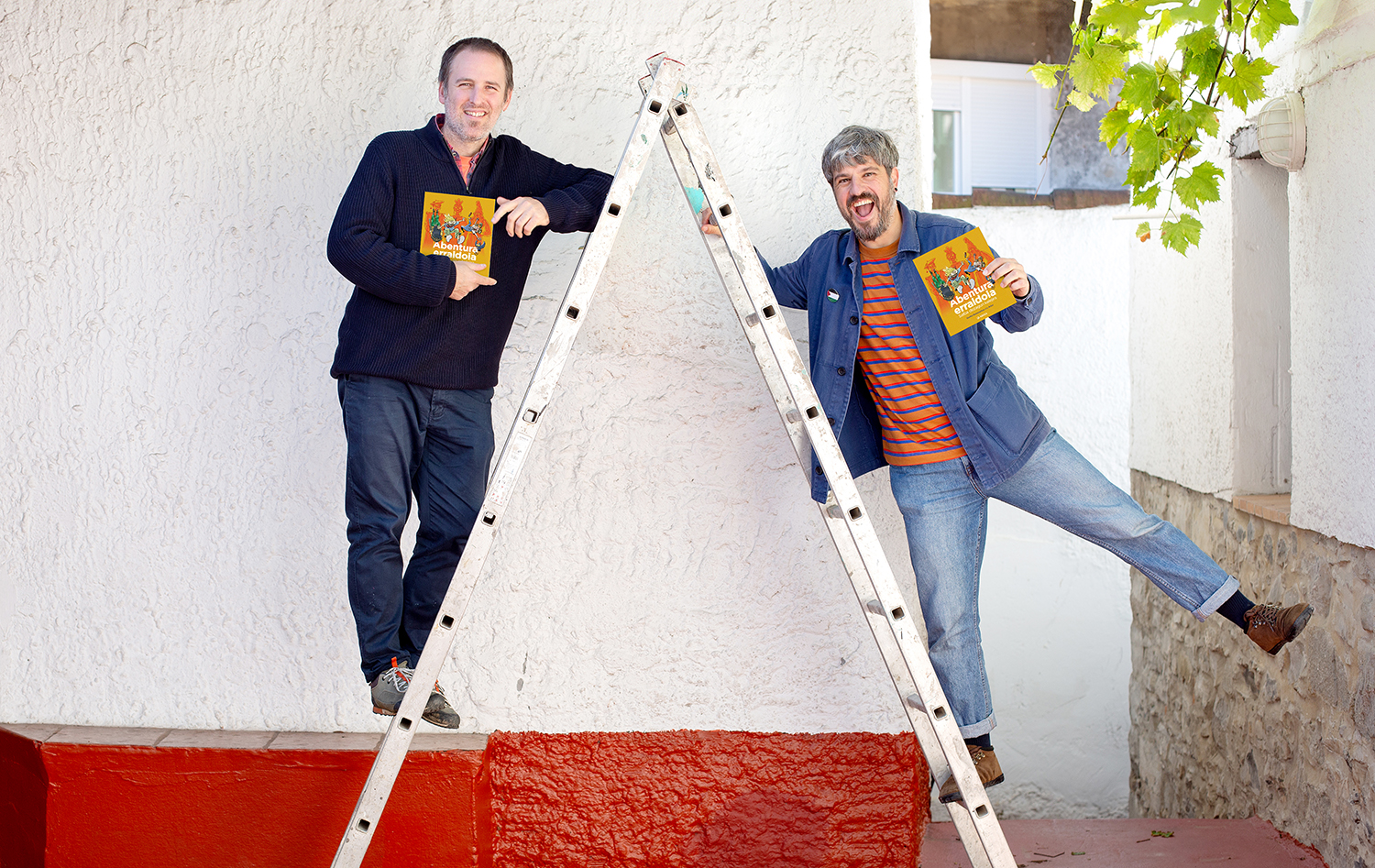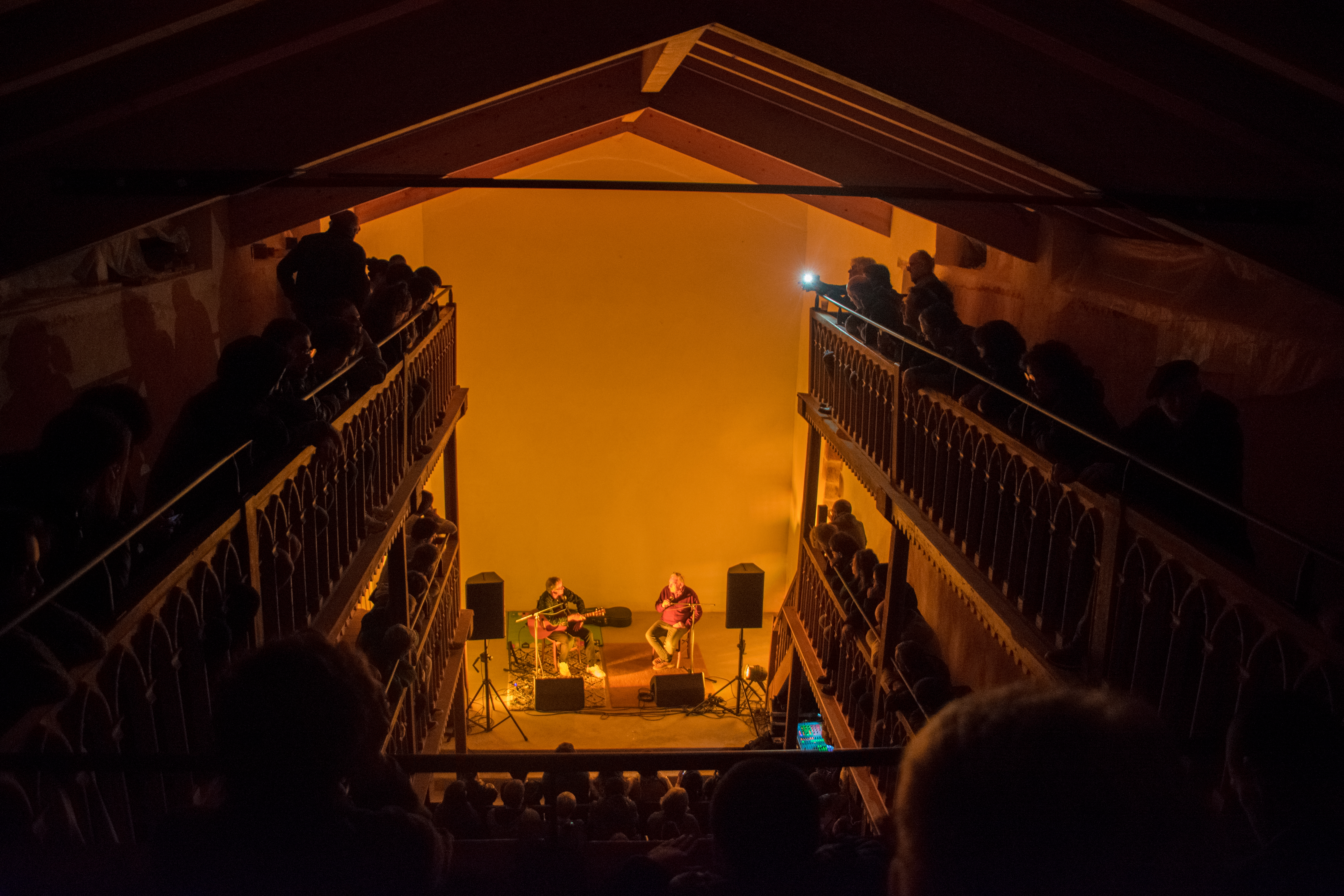"We also live with our personal past and that of the dead"
- We stayed in the Rila store of the San Juan district of Pamplona. From there is one of the memories of the poem Ez dira zaporea: “The Bulgarian yogurt purchased from Nina on Sunday’s walk.” It is Saturday, but Nina Kostadinova is at the store door, handing him a copy of the book and teaching him the poem Hedoi Etxarte (Pamplona, 1986) translating the passage. La de Oriente (Susa, 2008), Simplista (Susa, 2012), has the third book of poems of the series (Susa, 2021), dedicated to memory, personal and collective history, among others. In the tempering of a cafeteria, we talked about the characteristics of the book and the evolution of its work.

In the cover photo and in the poem that closes the book Plus Ultra comes your grandmother, Pilar Berezibar. Who else appears in the photo? The
rest belong to the house Errekalde de Arrasate. It was a great house. I think it was three plants, divided into two. I think the ones in the photo are the Indatares. It is surprising, because although most of the photos of the Berezibartarras have been lost, they have remained much more than those of our grandfather, who was familiar with landowners, of the Pamplona Basin south-west. We have much more graphic heritage of marginalized prolarians from a place where industry exists than from rural landowners of the same time. In addition, the images appear from different continents and times. The garments that appear in the images of Arrasate are very vivid, although you see pictures in black and white. On other occasions, they are all gray. In those of Arrasate there are often smiles, on other very serious faces.
He mentions dragons in the poem to the Errekalde. On a trip to Mondragon he also read the poem, where did the purpose of this tour come from?
His brother had the idea of honoring his father. We were joined by the historian and militant Juan Ramón Garai. Juan Ramón and our father had a great relationship, especially through his grandmother, who helped him identify people in the photos. Shortly after the death of her grandmother, a documentary on repression during the 1936 war, centered on women, was released in Arrasate. Pilar had a lot of things to do, but she never wanted to register, with the notebook she had to go and point, she didn't appear in the documentary. But his reflections are Arrasate 1936. The intermittent generation appears in the different editions of the book.
Juan Ramón made a story of the Arrasate labor movement with the excuse of the Errekalde or the Berezibar. We started with the monument to the rifles at the Upper Must, the place where he was in the Cerrajera Union, the Biteri school, the Errekalde house, and we ended up in the ratchet where the Consistorial House was. Juan Ramón knew the poem Dragoiak, and all I did on this tour, besides coordinating and inviting people, was read the poem. I'm not able to publicly read poems, let alone if there's such a meaningful and sad connection, if it's texts that have the accreditation of such a big failure. But at the same time, it was important for me to read that poem, it changed my way of understanding poetry. Here I understood what social poetry is, not as a poetry that has the function of showing the tensions of society as understood by academia and some sociologies, but as a poetry to unite all those who were listening to it. As a generation, the management of failure has been different for all those who were on a career path. Some are daughters of those mentioned in the poem, others are grandchildren... Some tried to eliminate what happened, to deny the terrible and to let future generations know almost nothing. In the case of others, the next generations have continued in liberating, revolutionary politics, if you will, and they have also suffered enormous repression, in other ways.
When I was writing the poem, I had no intention of doing it, but I was talking about the uncles, the mothers, the grandparents of the people who were in the act, and in a few verses give them a place, a unit, of a revolutionary and losing shared history. This poem came out to me as I was reading the Vietnamese poet Xuan Thuy, but it's true that I had passion for the Dragons, the JSU battalion, the place of the guitar, and there were some ties. It seems to me that, as things are, they had a very good reputation.
To confess the truth, this
poem has been extracted fundamentally from the works of memory carried out by Juan Ramón Garai and members of the association Intxorta 1937, from the book that is being completed in each edition. It's built largely with that, and then with the things our grandmother counted. I wanted to develop the idea of a saga, and also the nicest thing has been that the poem is working, but not with the surname Berezibar, I have been descended from those who were in other villages, in other institutions.
In relation to this, I have a big question, to some extent anger, where is the war of 36 in the Basque literature? Other important accusations are made, where is the literature on ETA, how has it been expressed, but where have the Basque writers been since the 1970s, but especially since the 1980s, in relation to that? The question we have to ask is why they have decided that this total hegemony is not a passage that literature will work on. Am I not saying that in 1940 Basque writers should be in that, but not in the 1980s? Not being in the 1990s and 2000s? Where are the film directors? I am not going to tell you that all the historical films that need to be made should cultivate that fragment, but I find it very curious. You can tell very little in a book of poems, and it wasn't just about telling it, but there's something to tell. The conclusion I draw is that it has been a political decision not to talk about it. There are some exceptions, but we don't think of more than half a dozen, and it's a very bad sign.
At the beginning of the second installment you will get a quote from Hannah Arendt: “What is the person without their story?” What are we forgetting?
Arendt has a very nice, little-known book about the Jewish female philosopher of the early nineteenth century of Rahel Varnhagen, and it is one of his reflections. I believe that we are our history, on the one hand, and as Nick Estar says in his book Our history is the future, from the conception of the time of the Siux, we do not live alone on that day it is today, we live with our personal past, but also with the personal past of the deceased. For me, the time our grandmother spent in the pool with a cousin of her in childhood may be more present, because she told us many times and for her that moment could be important than many things I can do every day. The deceased have this presence. The joys, failures and frustrations of the dead also have a place in us. There is a pretension to impose such a speed as to say that things are from the past. I am not interested in this reading from the Western tradition, linear, of delay and progress. I think politically it's pretty demonstrable that history doesn't work on that key, and I would say that our characters don't work like that either. This explains why a Latin motto used by the Anabaptists in the war of the era of reform, Omnia®communia, is considered a slogan by a local young man in Pamplona in the year 2021. No one of them has a blood relationship with those revolutionaries who massacred, but they see themselves as heirs to them. Not as an exercise in frivolity, but assuming history.
Two souls distinguish in the poem two forms, the story of everyday intimacy on the one hand and the story of the group, of the class on the other. Are they counterbalanced?
Yes, I feel a shock, but it's more literary. When I write about those things that happen to me in my day to day, I act in a way that can be a long way from political consciousness. When I write about a night with someone ten years ago and write the poem Dragons or the white Audi A4, I feel it as a very different impulse. I'm not talking about a political contradiction, but when I'm working that I get something very different. The result of these texts that, in principle, we would enter into intimacy seems to me to be almost without literary work. Surely because I have a lot of references, a full bibliography, which tells me that if you get right how to tell those things that happen when you're on a terrace, there's a poem there. And although I've looked for it in a rather obsessive way, I haven't found that much of that group story, it's not something that's reinforced today. Even historically, those who have in principle defended this, a Bertolt Brecht, a Roque Dalton, for example, I would say that they have not worked especially hard on the creation of the group, the genealogy. More has become an aesthetic of revolution, citing names, places. The decor has been worked on, concrete issues have been dealt with, but apart from the hymns, those who mention this first plural person do not make any mistake. Repression does, but it almost always departs from the staff or refers to a specific person. In that sense, Assata Shakur likes me a lot, doesn't have a lot of poems, but I think it's one of the things he does. I've come back again and again to Ezra Pound's poems to work with these kinds of poems. Because that guy takes you, grabs you by the hand and puts you in his impulse.
It's been nine years since you published your previous post. How has the voice of this book been shown?
I wanted to break with the previous voice, and that's very difficult. Now I'm at the same point. Now I think this is my voice, but this voice I've built. You have to find a tradition that exists or that you invent, that addresses some issues, from a certain place, and that can be a little bit consistent, and believe in that tradition. We have to think that this tradition has really brought something obvious to literature. In my first book, I was in the tradition of Surrealism, and from there I wrote. In my second book, I tried to immerse myself especially in the debates of the 1920s and 1930s. Lukacs, Adorno, Benjamin...
Since the second book, the anthology Poems of the place and the symbol of Brecht, edited by the editorial Pre-texts, has become a bridge. In the time before the simplists, I found it somewhat axial, because it's a selection of Brecht's poems about everyday life. I was kind of angry with the book, I thought I betrayed Brecht. At the same time, Rubén, a great friend who reads the texts before when I'm embarrassed or afraid to teach something to editors, seemed the opposite, that was Brecht's best book. One day I picked it up again and I'm not going to say that his best book, but I understood the sense of anthology. It is not, as I thought at the beginning, a naturalist Brecht or an extirpation of Brecht's policy, on the contrary, if we look at Brecht's position at that time, what personal, political, artistic decisions he made, those decisions appear in the book. It seemed silly to me to talk about the garden plants that need to be watered when the world was sinking from the perspective of when I was 20 or 22 years old. Then I realized that no, that the greatness of Brecht is there, that the greatness of Luxembourg or Gramsci is in their desire for nature and animals, and not so much in that view of the philosophical obsession that we have those who try to make political consciousness, to make concepts of ideas, as if history were only ideas.
We often end up doing just the opposite of what a tradition, in principle revolutionary, should do. We leave aside, not as capitalism proposes, but as revolutionary projects have proposed, what gestures mean, what cats mean and whether they should be named for Lenin, or the readers' groups for Krupskaya. There's life, there's what's at stake. From that bridge work I got to Louise Glück and then Sharon Oldsen. Emily Dickinson has always been present as a missing link. I saw it as something isolated, and I've realized that no, that that voice has a lot to do with America's poetic tradition, and that it also takes it forcefully for me always very interesting Edna St. Vincent Millay. It combines very well an urban lens with nature, a bag consciousness with an affective consciousness. In my case, that's been the way: finding a genealogy, with books, names, places, ways of doing, and once you're immersed, working your scenes, your themes...
It seemed to me that in this third one there is more awareness of the work, that in some way the two books anteriores.He are added up and passed with an indescribable fate, and I can think of nothing else in the literary systems that I know, and it
has been publishing Susan. Publishing Susan means that when you make a poem, to start with, you make a book and not an anthology of your poems, and so, before the book comes to the printing press, they ask you a lot of questions about socializing literature, and you do them to yourself. I started on that fate. The day we talk about the draft book, in the Café Roch de Pamplona, with Gorka Arrese, Iñigo Aranbarri and Patxi Larrion, we already talk about literature, what I read, what I was interested in... I remember how Iñigo Aranbarri followed the line of Préverte, Stefan Zweig's chess novel. I still get the rush of fourteen years ago.
In the elaboration of the second book there was a crisis in some of the issues raised in the book, we carried out an almost complete rewriting, among other things because that book was located in other places and Arrese told me that it had to pass in the County of Pamplona, he got it right. Then, the usual thing, as has happened in this book, a third of the written poems have not come to the book. Leire López told me more than once: "This is very simplistic," or "This doesn't match the voice of the book"... There are issues that I had dealt with in more than one poem, that I've rewritten, and they haven't come to the book for the benefit of the book.
For me, everything is making sense of the work. All titles start with ‘s’, the first book had two parts, the second three and the third one has four. There is a reflection on the skin... In the second book, Gorka Arrese reinforced this issue of consciousness, of seeking another voice. I saw it very clear after Simplista ended, a couple of years later. I kept writing poems, but they were poems that could be included in the previous book. When I started again four years ago, I was leaving the Lilia de Fuego, those things of falling in love with the world again.
If you want to do something, you have to be able to do something different, that's what's worked for me. There is awareness of the work, of the work and of the limits. I have in mind a couple books that are not poetry.
The exercise that I find increasingly difficult is to find a different voice, the literature that comes to me is limited in quotation marks, there are not so many voices, but we will see.
Beware of that view of the South. Firstly, to demystify the blind admiration of the green land, the white houses and the red tiles, unconditional love, fetishism associated with speech and the supposed lifestyle. It leaves, as Ruper Ordorika has often heard, a tourist idea... [+]
Let's talk clearly, bluntly, without having to move later to say what I had to say: this game, which consists of putting together the letters in Basque, happened to Axular. Almost as soon as the game is invented, in such a way that in most of Gero's pages the author gives the... [+]












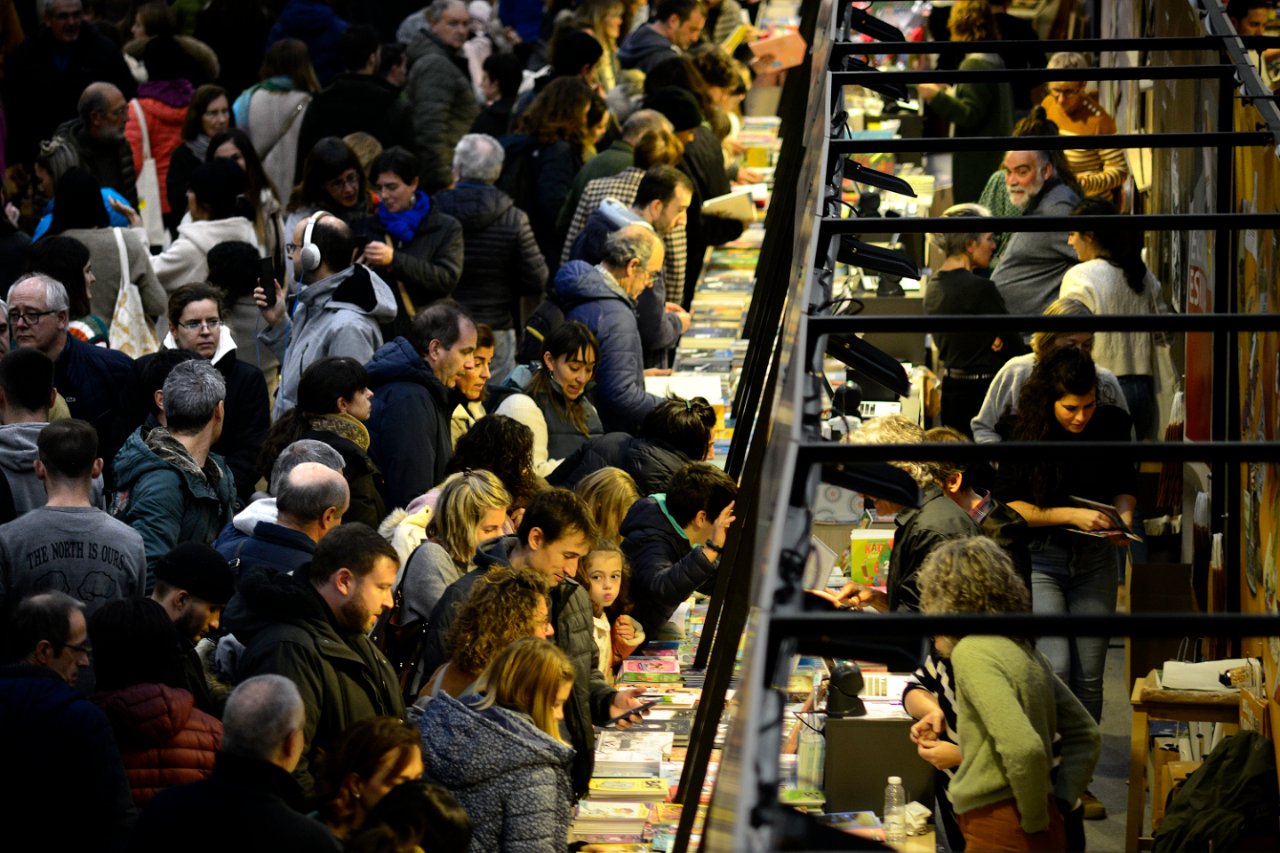



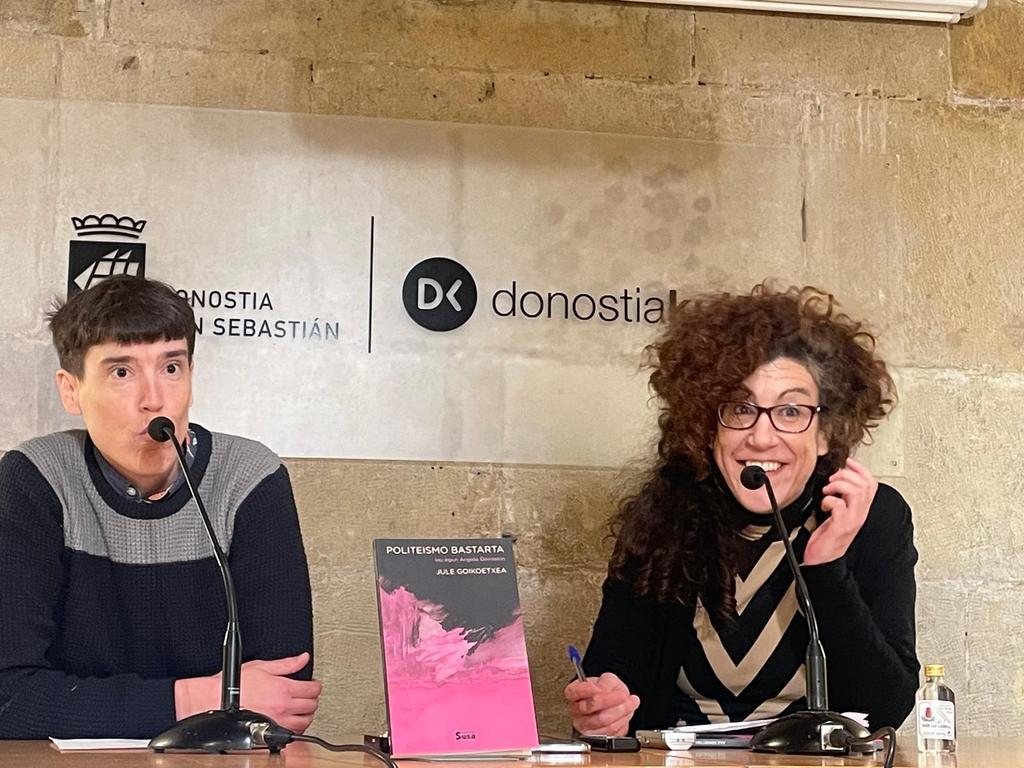

.jpeg)

